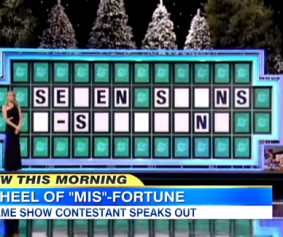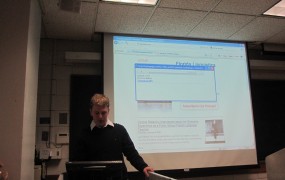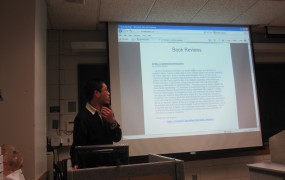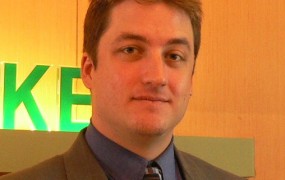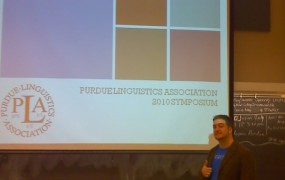The High Price for Linguistic Ignorance, and the False Danger of Dropping Gs
Tuesday, January 1st, 2013 @ 8:35AM
–Article by Lee Ballard
In a video that has since gone viral, a recent contestant on Wheel of Fortune was penalized for the G-dropping in her pronunciation of the correct answer “Seven Swans A-Swimming.” This should trouble linguists for 3 reasons.
First, the incident reveals the stigma against users of non-standard accent or dialect. Although a convention of standard American English does require that progressive aspect “I-N-G” verbs be pronounced with a special “NG” sound (called the “velar nasal” by linguists), no native speaker of English would claim he or she did not understand the contestant’s answer. As far as spelling is concerned, it has long been established that English words may be spelled differently from how they are pronounced. When two native speakers pronounce words differently, this doesn’t change the spelling. Although there is of course a literary tradition to alter standard spelling to reflect different regional accents—in the novels of Mark Twain for instance—this practice really has no standard rules and is certainly optional. Otherwise teachers would have to count alternate spellings correct on tests depending on each student’s dialect. No teacher would ever attempt such a ridiculous plan.
In other words, if you go to NPR’s website, you will not read about a show called “Cah Talk.” As Gershwin put it, I say potato, you say “potahto,” but I only spelled it that way so you get the joke. Let’s call the whole thing off, and spell them both “potato.”
Maybe you’re thinking, “At least he didn’t spell it ‘potatoe!’” Clever you. Let’s take a side note before getting to the second part of the Wheel of Fortune trouble.
If the video about Dan Quayle is to be believed, this spelling is tempting. But do you know why? Even though “potatoe” is of course wrong, the spelling interestingly enough happens to reflect a well-established pattern of sound change that languages go through in their development called “analogy.” The spelling with “e” in the singular could be analyzed as a back-formation from the plural form, in which the “e” fulfills no phonological purpose. It even touches on the grammatical issue of mass vs. count nouns.
The basic contradiction is this: I assume that the Wheel of Fortune judge would contend that if the answer were really “a-swimmin,” then it would have been spelled with an apostrophe in the game. But this is getting the facts backwards! As anyone who’s ever watched it knows, the point of Wheel of Fortune is to spell words, not pronounce them!!! Such stupidity is regularly held as up conventional wisdom in a linguistics-ignorant society. Meanwhile, the underlying contradictions go unnoticed.
The second way in which the Wheel of Fortune incident should be troubling to linguists is that it reveals a lack of understanding of the linguistic facts grounding the alternate pronunciation. I became familiar with the phenomenon of Appalachian A-Prefixation when I took my first Linguisitics class at UNC-Chapel Hill in 2004. Many dialects historically and today have been “G-dropping” for years. It turns out that Appalachian English, as one of the many, also has “G dropping.” But it is the only dialect I know of that still has A-Prefixation. This would suggest that the pronunciation “a-swimmin’” is not only not wrong, but actually preferable to the non-dropped version expected by the judge! Furthermore, although I’m using the term “dropping” as a shorthand in this blog post, the velar nasal phone is not an alveolar nasal with something added, and which, as suggested by the term, can be “dropped” to become an alveolar nasal again. What makes the difference possible for the two stops (yes, stops; yes, “nasals” are really nasalized stops/plosives!) is that the stoppage of air is located at a different place in the mouth, with the rest of the physical characteristics unchanged. Although also true that the “g” sound is also voiced and velar, strictly speaking, the difference should not be what linguists call “ordered.” It is only in the spelling that “NG” equals “N” followed by “G.”
Phonologically, it’s not that G-dropping dialects lack velar nasals entirely. The facts can be partially explained by invoking the concept of a word boundary. In Linguistics, a word, a syllable, and a morpheme are all types of units surrounded on the left and right by silent markers called boundaries. Thus “(a-)swimming” can be pronounced “(a-)swimmin’” because of a G-dropping process that is activated on word-final velar nasals, but only word-finally. But imagine for a second you’re a speaker of a G-dropping dialect (maybe you really are!). If I’m “Singin’ in the Rain”—with a dropped G—I’m not necessary “Sinnin’ in the Rain”— with two dropped Gs, one word-final, the other not (morpheme-final as well as syllable-initial and/or intervocalic, depending on your theoretical slant). This example (singing/sinning) is a minimal pair showing the functional load of the velar vs. alveolar nasal distinction. In fact, all so-called “G-droppers” would make the distinction between “singin’” and “sinnin’,” and between “sing” and “sin,” unless of course they’ve got a radical religious belief! If it were just about the boundary, than the contrast between “sing” and “sin” would not be possible. So finding an analysis is actually quite tricky (and may in fact underlie a paper I am not aware of). Just when does the G drop (i.e., the alveolar nasal phone is used as an allophone of the velar nasal phoneme)? For us linguists, the facts of non-standard varieties (i.e., “vernaculars”) are often more interesting than the facts of standard ones, which can be watered down and stripped of their personality.
Finally, the Wheel of Fortune incident exposes linguists for not having their knowledge known by the world at large. The N/NG issue is a basic phenomenon that every foundational “Intro to Language” survey course could cover. If the issue had been in another commonly-taught field, for instance history, I think members of the audience, other contestants, or perhaps the host himself would have spoken up in protest. Yet what actually happened was that the judge on “Wheel of Fortune,” in making his or her unilateral and spurious enforcement of a dubious interpretation of one contestant’s phonology, got away unscathed while members of the audience knew something wasn’t quite right. When I watch the video, I can feel their reaction. Their acquiescence following the ensuing confusion is revolting to me, but I do not blame them. I blame our whole society. One of the missions of this site is to spread linguistics from the ivory tower of large universities out to the world.
So those are some reasons why we as a community should be troubled: the stigma, the ignorance about language, and the fact that linguists need to do more to spread the message. It is not the woman in the show that pays the highest price for linguistic ignorance. It is us all as a society.
The Florida Linguistics Association has a vision for a day when linguistics has established itself as an essential part of the liberal arts curriculum. On this New Year’s day, a day of new beginnings and an idealistic hope for the future, John Lennon’s vision for the world comes to mind. Maybe spreading linguistics will not be so “easy if you try.” But since the ways we speak affect all of us so deeply, the FLA still hopes for a day when all people will be “living life in peace” with a basic knowledge of human language. Or, for that matter, “livin’.”
PS: For those of you that are wondering, I’m not personally a regular G-dropper, but I have been known to drop the occasional beat. For more on the “velar nasal” as a linguistic parameter of cross-linguistic phonology, check out the WALS entry here. For more on the prejudice and stigma associated with non-standard dialects, just keep your ears open and listen to the junk people talk or imply. To help with the effort to spread linguistics, make a contribution to the site by sending an email to the FLA at fla@floridalinguistics.com, or take a linguistics course at a college/university near you.
Posted by floridalinguistics
Categories: Lee Ballard

